COVID-19 relief targets vulnerable students, more aid needed
Campus community is showing its grit, heart, innovation
May 6, 2020

At Crossroads Dining Hall, volunteers packed grocery bags on April 21 for needy members of the campus community. The bags were taken to pick-up sites around UC Berkeley and also delivered to students who couldn’t leave their homes. (Photo by Natalia Gillis Semeraro)
Sheltered in place in West Covina, in her family’s tiny two-bedroom apartment, UC Berkeley junior Cindy Mendez Moreno tries to muster motivation to study in the dark, while her parents and three sisters sleep. Only then is it quiet, with space to work at the kitchen table.
Tommy Gardner, a philosophy major with unreliable Wi-Fi at his Berkeley apartment, found himself losing network connection, and his sanity, midway through several online quizzes. He also missed homework deadlines when his outdated computer glitched.
Housebound in Hayward, new dad Tyler Lyson, a senior about to graduate, has braved writing essays while his teething baby cried. The political science major now sweats how to pay the rent — he and his wife have been laid off from their jobs — and is considering the military.
There isn’t a student at Berkeley untouched by the challenges — whether financial, academic, mental or physical — of the coronavirus pandemic, which has upended spring semester 2020 and created worldwide chaos, illness and death. The campus is empty, courses are online, in-person graduation is off, the job market for graduates is scrambled and Berkeley’s most at-risk students are even more so.

Sheltered in place with her parents and three sisters in a tiny apartment in West Covina, Cindy Mendez Moreno, a comparative literature major, said she is “always afraid that when I turn on my microphone [for online classes] that my professors will hear the blender or the background noise of an action movie.” She is grateful that Berkeley COVID-19 relief funds provided the means for her to buy a laptop and help her family pay the rent. (Photo by Frida Mendez Moreno)
Like the virus itself, the student needs caused, as well as exacerbated, by COVID-19 seem too numerous to be fixed, even with profuse support offered by the campus community — monetary donations, food giveaways, residence hall refunds, emergency child care, virtual counseling sessions, free COVID-19 testing for symptomatic students, extra time to complete graduate degrees, even Zoom dance parties and open mic poetry picnics.
“This is a really difficult time. Everyone is struggling, especially students and student-facing staff, and there’s not a simple model for how to do this, how to help,” said Lisa García Bedolla, dean of the Graduate Division. “This is a moment for us to come together as a community and take care of those who are the most vulnerable.”
A new online hub for student relief
One tool has just emerged, a model being called a rarity in higher education during the COVID-19 crisis. After meeting daily for more than a month, the UC Berkeley COVID-19 Student Relief Circle — a coalition of staff, students and faculty from a broad array of campus units, offices and programs — has successfully pooled individual relief efforts at Berkeley into one coordinated endeavor to help students in pandemic peril.
The UC Berkeley COVID-19 Student Relief Funds is a new online hub where enrolled students with housing, food, health and technology needs can apply for help. At the easy-to-use site, accessed by signing into Google, they can select the best path based on their student status.
Aid from various funds, determined behind the scenes by relief funds staff, is available for undergraduate, graduate, undocumented and international students. The UC Berkeley Basic Needs Center COVID-19 Living Guide lists additional types of support, including emergency housing, COVID-19 testing for uninsured, undocumented or homeless students, and academic and mental health counseling.

Eva Linares, a medical assistant in primary care at the Tang Center, gives a worried student a description of the criteria for getting tested for COVID-19. (UC Berkeley photo by Brittany Hosea-Small)
The model is justice- and belonging-based, said Ruben E. Canedo, chair of Berkeley’s Basic Needs Committee. He mobilized the institution-wide effort after noticing what he called “an equity gap” — individual philanthropy, like gift card distribution — popping up here and there on campus as students began leaving once instruction went online in mid-March.
“We’re a community-at-large, and if we didn’t invite folks to come in, aggregate and move in a collective direction, some students would get overly supported, and some not at all,” he said. “This is the only effort, to our knowledge, at a university during COVID-19 that’s coordinating relief funding across departments and divisions.
“We take pride in the UC system as an engine of social mobility. It’s one of our brightest beacons, and we have a substantial amount of students who are first-generation and from the lowest income backgrounds. But the global impact of COVID-19 is deeply unequal, and these same students — who we like to celebrate and honor — are struggling to survive.”
One of the funds in the mix is the Student Technology Fund, created in 2014 by a $51-per-semester fee that students voted to impose on themselves through spring 2021. The fund, which provides grants to fund technology tools and services for students at Berkeley, has been receiving “some gut-wrenching testimonials” from students without laptops or adequate Wi-Fi, said Jennifer McNulty, the fund’s analyst.
“A common thread,” she said, “is that these often are first-generation college students returning home to parents who are now unemployed or are students with multiple family members relying on one computer, or none at all.”
One student wrote that he was walking miles into his rural town’s center to sit on the ground of the parking lot and use a shuttered shop’s internet connection to do his studies, said McNulty. Another, unable to afford a computer, was writing her thesis on her phone.
So far, the fund has distributed 470 laptops and 200 mobile Wi-Fi hotspots with paid unlimited data plans for six months and will be providing another 300 laptops and 200 to 300 hotspots. An ongoing needs assessment survey that it conducted starting in March 2020 drew more than 1,000 responses, which McNulty said she’s certain “doesn’t capture the extent of the need” within the student body.

In late March, Jennifer McNulty, the Student Technology Fund’s analyst, stands in front of the first wave of mobile Wi-Fi hotpots being sent from a FedEx office in Alameda to Berkeley students in need. The fund’s funding decisions are made by a student committee that’s supported by staffer NcNulty. (Photo by Jennifer McNulty)
The fund, governed by a student-led, student-majority committee, successfully invited Chancellor Carol Christ to submit an application for student technology relief for the campus. Yesterday, the fund granted $717,379 in relief, which will provide Zoom Pro access for all students and expand hardware relief efforts.
McNulty, the staff member who supports the committee, said that being able to provide this support is an honor, as is “having peers in higher education contacting us to use our hardware relief program as a model. But student fees should not and cannot shoulder so much of this burden long-term.”
“COVID-19 is exacerbating technology equity and access issues, but the digital divide predated it,” said McNulty. “This is a systemic problem that needs an institutionally coordinated and funded solution.”
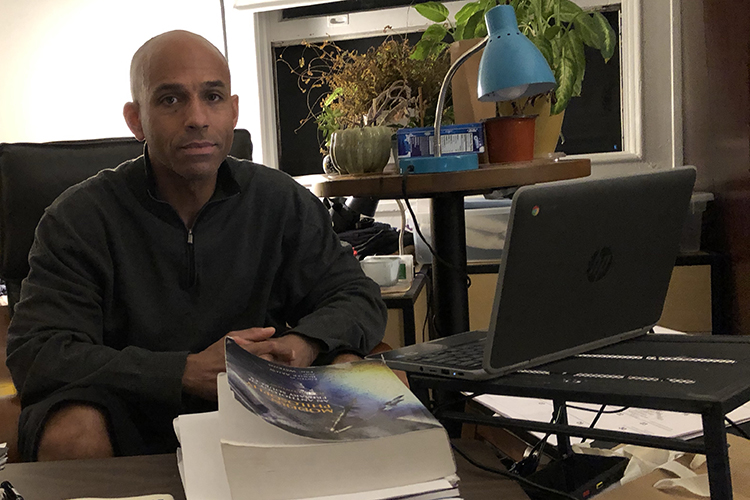
Philosophy major Tommy Gardner, who applied for and received a new laptop and a hotspot device said that, “without sounding over the top, I can’t express enough how grateful I’ve been to be under the auspices of this school (during the COVID-19 crisis). The fact that it’s in place and functioning has been a huge relief and support.” (Photo by Tommy Gardner)
Aid arrives, awards bring relief, fundraising continues
Struggling students Mendez, Gardner and Lyson already have benefited from the campus’s relief funds. Mendez, for example, received a laptop from the Student Technology Fund and a cost-of-living adjustment from the financial aid office that allowed her to buy a desk and to help her parents pay rent now that she’s distance learning in Southern California.
“I swallowed my pride to ask for financial aid, but I probably would not have finished the semester without it and can even do online summer courses,” said Mendez, an undocumented and first-generation college student. The same fund provided Gardner, a transfer and formerly incarcerated student, with a laptop and a mobile hotspot device. First-generation college student Lyson got an emergency assistance grant — handy for rent, food and diapers.
“The money that came through was huge, because my wife was the breadwinner as a flight attendant, and the flight industry’s been really affected by COVID-19,” said Lyson, adding that his job at Levi’s Stadium also “dried up. … It’s been extremely difficult, especially with a baby.”
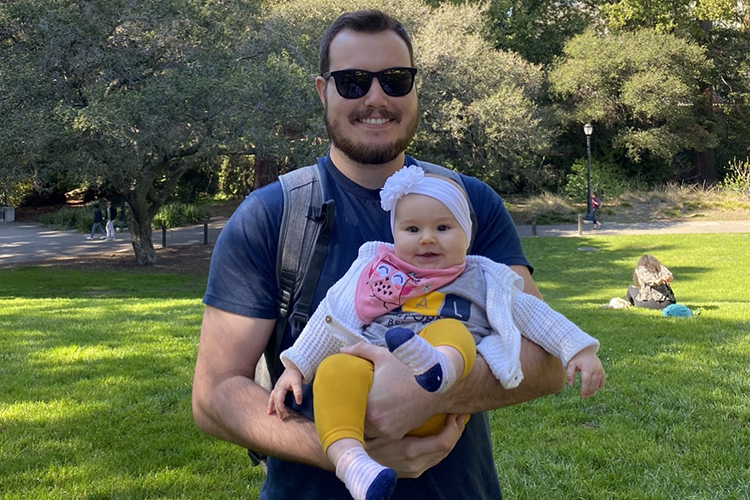
Tyler Lyson, a student parent and political science major, said this is a photo of himself and his daughter Lisa “before the virus, and we were very happy!” (Photo by Lucie Demangel-Lyson)
A key fund in UC Berkeley COVID-19 Student Relief Funds is the donor-funded Student Emergency Fund, which dates to 2011, when a fire left a Berkeley apartment building on Haste Street uninhabitable and several students homeless. Before yesterday’s #GivingTuesdayNow, a global day of giving and unity in response to COVID-19, $564,048 had been raised for the Student Emergency Fund by 960 donors to support more than 428 undergraduate and 98 graduate and law students. Today, the fund’s new total is $753,713 — another $189,665 was raised by the campus on Giving Tuesday.
So far, the UC Berkeley COVID-19 Student Relief Funds have awarded $925,537 to 546 students through the Financial Aid and Scholarships Office COVID-19 Emergency Fund, which includes relief from the Student Emergency Fund.
Another fund, the Basic Needs COVID-19 Fund, is providing direct support for food, housing, medical and technology needs. As of this week, about $80,000 in rental assistance has been awarded, and more than 1,500 bags of groceries have been packed and distributed to 724 students and more than 300 staff members, visiting scholars and postdoctoral candidates.
Since the shelter-in-place mandate, Berkeley’s Basic Needs Center has seen a dramatic increase in the number of students with basic needs-related crises who require assistance from the center’s case management team. Nearly 70 students have received counsel on issues including emergency housing, eviction and food insecurity.
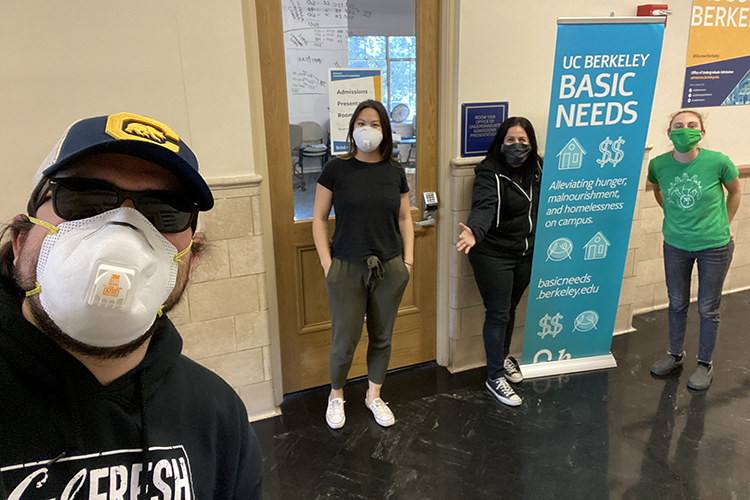
“Remote doesn’t mean people are gone from the community,” said Ruben Canedo (left), chair of Berkeley’s Basic Needs Committee. He and members of the UC Berkeley Basic Needs Center team, posing here outside their current outpost in Sproul Hall, Room 103, have continued providing groceries, emergency housing assistance and case management to students in need, wherever they’re sheltering in place. (Basic Needs Center photo)
Cruz Grimaldo, assistance vice chancellor and director of Berkeley’s financial aid office, said the student needs surfacing during the coronavirus crisis “existed even before the pandemic, but COVID-19 has brought them all to the forefront.”
Added Sunny Lee, dean of students, “COVID-19 has really highlighted who our most vulnerable and marginalized students are and exposed systemic inequities.” And put them more at risk.
For example, said Grimaldo, during the last academic year, 800 families submitted requests for a reconsideration of their ability to pay and asked the Financial Aid and Scholarships Office for support, “but we think that number will triple because of the pandemic and the challenges it’s bringing to families.” Student parents with financial aid automatically received additional funding to help defray COVID-19-related costs.
Of the $30 million in federal CARES Act funding that Berkeley has received, $15 million is earmarked for direct student support, and awards are starting this week. The government stipulated that this funding can’t be used for undocumented students, so Grimaldo said Berkeley will give equivalent awards to as many as 300 undocumented students through the privately-funded Student Emergency Fund.
While the government funding is helpful, Grimaldo said the campus has projected a $200 million COVID-19-related revenue loss. “The economic situation across the state is so grim,” she said, “that support for our most vulnerable students — especially through giving to the Student Emergency Fund — has never been more important.”
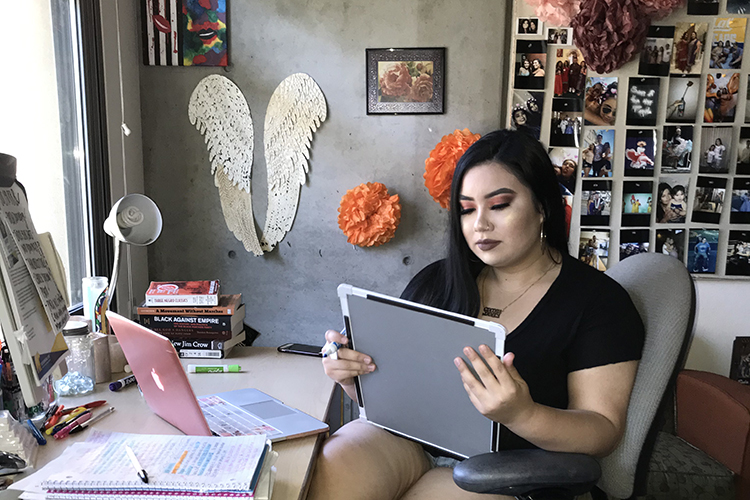
In her room at the WADA Apartments in Unit 2, Janey Lopez, a resident adviser there, has continued interacting with students, even those who left the area. She said that, at a virtual dinner she organized for WADA residents near and far, “no one really ate. The interaction was great, and the residents were engaged and thankful.” (Photo by Michelle Perales)
Reaching for and giving help, online
In addition to financial woes, many Berkeley students are struggling to navigate online learning, social isolation, living with family again, loss of motivation to finish the term and other COVID-19 challenges.
Lorena Valdez, director of the Transfer Student Center, said shelter-in-place orders resulted in many Berkeley students returning to their hometowns, where some family members have lost their jobs. Students are feeling disconnected from their peers, she added, and from the communities they had built on campus.
“It breaks my heart,” she said. “I’m talking to students online, and I can tell their energy is different. Their spirits are depleted. For some, it’s just about trying to get through this semester, get over this hump.”
Her colleague, academic counselor Steven Nguyen, said COVID-19 has prompted a more than 10% increase in virtual counseling sessions for transfer students, as well as online workshops on remote learning, seminars on self-care and virtual game and movie nights.
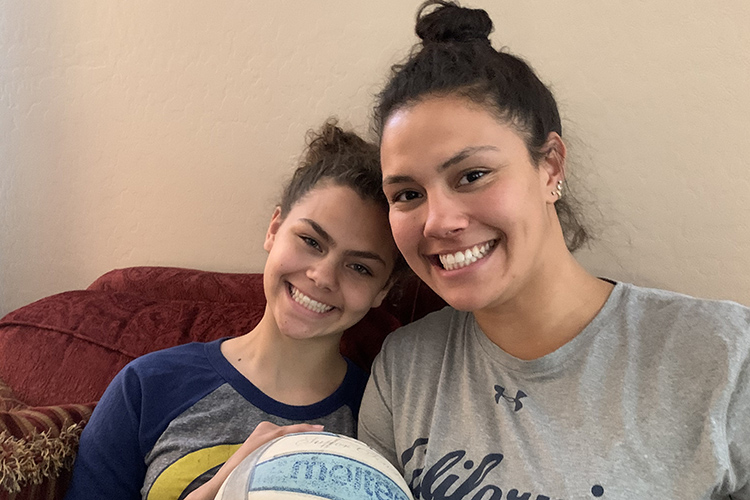
In Arizona, Cal Women’s Volleyball Captain Preslie Anderson and her whole family, including sister Ava, 13, are playing sand volleyball during COVID-19 in bi-weekly scrimmages. Anderson says she’s striving to “give it my all” to keep her team motivated, connected and in shape, even during shelter-in-place restrictions. (Photo by Dylan Enwiller)
Transfer student Sarai Santamaria, a former foster youth, is organizing Zoom workshops to help current and former foster students work through the trauma that emerges from being sheltered in place. Also struggling are students whose sexual or gender identities are not met with acceptance when they return home to family.
“Some might see going to school and to campus as a respite from abusive environments,” said cici ambrosio, director of women’s resources for Berkeley’s Gender Equity Resource Center. “So, being put back in that environment during this time can cause increased amounts of stress.”
Billy Curtis, GenEq director, said he and his staff are surveying the greater campus to determine how best to help the communities they serve. They’ve been holding online events that address issues including self-care, navigating non-supportive living environments and how to combat social isolation and build community while social distancing.
Preslie Anderson, captain of Cal Women’s Volleyball, is adjusting to life without her tight-knit team, a volleyball court and her final spring season of play. “I miss my teammates 24/7,” she said. “I thought I’d see them again on campus, after spring break, but I didn’t realize the magnitude (of the pandemic).”

To help his Cal Men’s Soccer team stay calm during the COVID-19 pandemic, Lucas Churchill leads his fellow student-athletes in meditation during their weekly team meetings on Zoom.
Weekly team chats and daily Zoom calls, studying offense for next season and meet-ups with a sports psychologist help return structure to the student-athlete’s life while she’s with her family in Arizona. “I was really looking forward to giving it my all, in the captain role — pushing everyone in workouts, organizing things, creating team culture — but that can still be done,” she said. “I’m doing the most I can to benefit the team with what I’ve been given.”
Meanwhile, Cal soccer player Lucas Churchill, a junior, is leading online meditation sessions from his basement bedroom in Sacramento as part of his team’s Wednesday Zoom meetings. On Thursdays, he also offers CALM (Cal Athlete-Led Mindfulness) — he began it on campus prior to COVID-19 — to any Cal student-athlete.
“I started meditating in my freshman year when I was struggling with mental health issues. It helped me immensely in my own life, and I thought other students dealing with a tough time deserved access to this,” said Churchill. “Now, with COVID-19, we’re all dealing with the same thing, and meditation is universally beneficial.”
Managing expectations, choosing grit
Integrative biology Ph.D. candidate Maryam Sedaghatpour, unable to start collecting data in Western Asia because of COVID-19-related travel bans, wonders if she should alter her research project or take a year off. She risks running out of her National Science Foundation fellowship that she’ll need for her year of fieldwork abroad.
“I could change my dissertation,” she said, “but that would be detrimental to my career goals.”
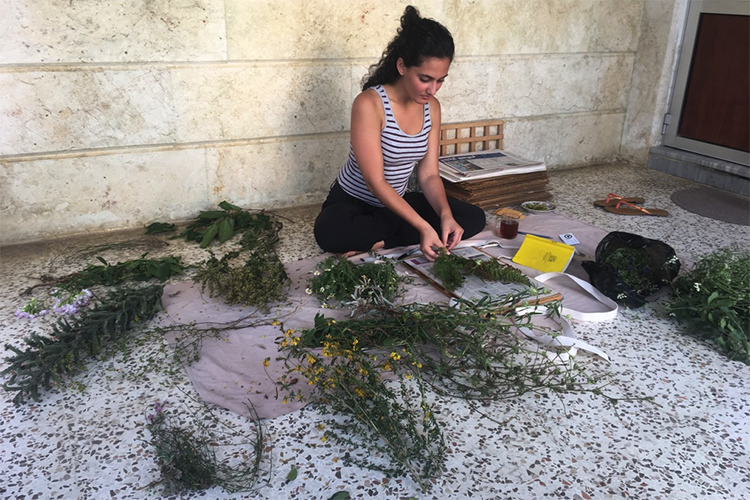
Third-year integrative biology Ph.D. candidate Maryam Sedaghatpour can’t return to Lebanon and Syria to do fieldwork because of COVID-19 travel restrictions. “I was planning to fly out on April 15 and start collecting data,” she said, “but now I’m in this limbo of, ‘What do I do? Sit and wait? Or change my project altogether?’ … It’s all really uncertain.” (Photo by Angham Daiyoub)
Graduate students always carry a heavy load, but even more so now, said García Bedolla. Like Sedaghatpour, many worry what lost research time will mean for their overall progress at Berkeley. Graduate student instructors (GSIs) have had to shift their entire mode of teaching online, and “there’s no crash course for pedagogy,” she said. “They’re also taking on their students’ worry and anxiety.”
At home, students with dependents are suffering from income loss — 70% of those who applied to the Basic Needs COVID-19 Student Relief Fund within 24 hours after it launched were graduate students, said Canedo — and are juggling academics and child care.
A one-year normative time extension has been made for graduate students to finish their work, said García Bedolla, and the Academic Senate has asked the systemwide senate to consider “lifting the limit on the number of semesters a student GSI.” In addition to expanded student parent grants, free emergency child care has been increased from 50 hours a semester to 64.
But García Bedolla cautioned that there are no perfect solutions.
“Students want the university to make them whole, but that’s just not possible in the current, extreme circumstances,” she explained. “Everyone is working very hard to ensure that, at minimum, our most needy students get the help they need to stay afloat.”
“The need is huge, and we’re trying to manage expectations,” added Canedo, “but some students will be disappointed, and it’s heartbreaking. We’re definitely going to have to say that there isn’t enough to take care of everything students need.”
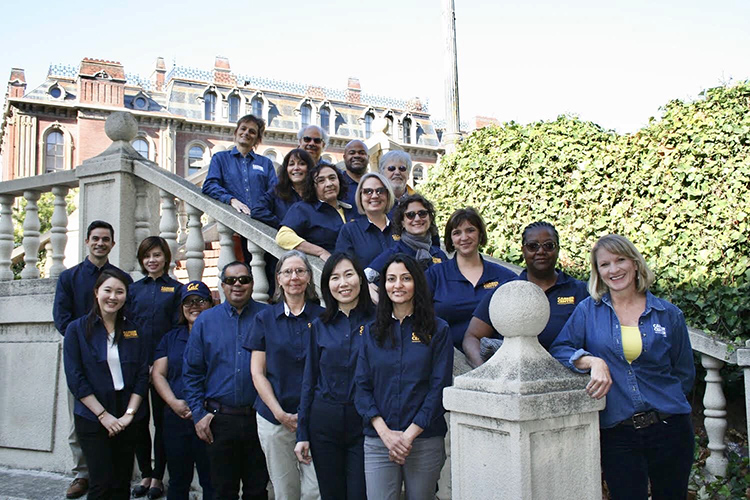
The counseling and programs team at UC Berkeley’s Career Center, shown here before the pandemic, continue to provide students sheltered in place with coaching, resources and programs to help them become ready for careers. (Career Center photo)
But it’s impossible to ignore the campus community’s perseverance in the face of COVID-19, said Sue Harbour, senior associate director at the campus’s Career Center.
She and her team are helping students panicked about the job market to stay in the game with weekly virtual Coffee and Career chats, inspirational video messages from counselors and 24/7 resources that include guaranteed feedback on cover letters and resumés within 48 hours.
“Employers are still hiring,” she added, “and many companies that have hired our students as interns are converting those internships to virtual ones.”
A virtual, 10-campus, UC-wide job fair will be held May 26-27, Harbour added, and there is capacity for 150 employers to take part.
“At first, when COVID-19 hit, I think many of us at Berkeley had anxiety, and the pandemic keeps bringing changes weekly, if not daily,” she said. “But it’s wonderful to be on a campus where people have grit. It’s going to take a lot to knock us down.”